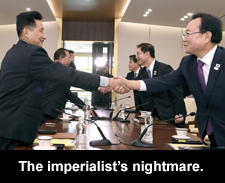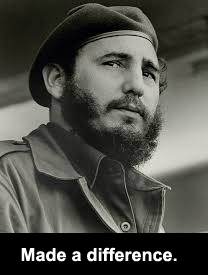Sometime in the coming days, the North and South Korean Winter Olympic Teams will march together under a unified flag, and the Women’s Hockey Teams will play on the same side. And it looks like it’s happening, now that the International Olympic Committee has said it’s okay. Think about that statement for a moment – did they really need to deliberate on this? It’s just a freaking game, people. If it provides a means of reducing tensions, why would your cheesy rulebook ever stand in the way? Score one for President Moon Jae-in, over the objections of his country’s hardliners and, of course, the United States.
 Think it strange that the U.S. would be against a lessening of tension? Well, it’s not just a Trump thing. There’s a deep imperial institutional bias against ending that conflict, and it manifests itself in a host of different ways. Just Wednesday of this week I saw an NBC story about the North Korean woman who allegedly blew up a South Korean airliner; she is out of jail, living in exile as a defector in South Korea. The bombing was decades ago – so why did the network decide to dredge this story up now and hang it around the father of the current North Korean leader’s neck? I would say that NBC is about as close to the core of the U.S. foreign policy establishment as any institution can be. With a lot of positive stories coming out about the glimmer of North/South detente in Korea, it’s no surprise that this old chestnut would bob up to the surface.
Think it strange that the U.S. would be against a lessening of tension? Well, it’s not just a Trump thing. There’s a deep imperial institutional bias against ending that conflict, and it manifests itself in a host of different ways. Just Wednesday of this week I saw an NBC story about the North Korean woman who allegedly blew up a South Korean airliner; she is out of jail, living in exile as a defector in South Korea. The bombing was decades ago – so why did the network decide to dredge this story up now and hang it around the father of the current North Korean leader’s neck? I would say that NBC is about as close to the core of the U.S. foreign policy establishment as any institution can be. With a lot of positive stories coming out about the glimmer of North/South detente in Korea, it’s no surprise that this old chestnut would bob up to the surface.
Of course, blowing up an airliner is a heinous crime. We’ve done it – recall the shootdown of the Iranian Airbus back in July 1988, to say nothing of our support for CIA asset Luis Posada Carriles’ downing of the Cuban airliner carrying their Olympic fencing team in 1976 (the perpetrator now living unmolested in Miami). Of course, so too is blowing up a whole country. We’ve done that, too … to North Korea, for instance. Putting that aside for a moment, it seems clear to me that we have a strong resistance to defusing this Korean bomb. When obvious peaceful solutions are available and remain untried, it’s reasonable to assume that there are other considerations at work.
Consider this: the Korean conflict gives us a strong foothold in Asia. When it flares up, the many of the regional players turn to us. It provides justification for our massive military presence in the south and substantial presence elsewhere in the region. Most importantly, the conflict prevents greater international cooperation leading to full integration of that region’s economies, independent of the American-dominated global system. That, I suggest, may be the nightmare scenario that keeps our planners awake at night – not the prospect of nuclear war.
Changing our priorities in Korea is going to take real work. It goes way beyond party and personalities.
luv u,
jp

 This cannot be overstated: South Africa and some of its immediate neighbors (Namibia, Angola) would not be the nations they are today without Cuba’s intervention on their behalf in the fight against the racist Apartheid military and its allies. Whatever criticisms anyone may have about Castro’s rule and his repression of internal dissent, we have to acknowledge that the Cubans have engaged in humanitarian intervention to a degree that far surpasses anything we have done. They did so at great cost: Washington really turned the screws on Havana, making them pay dearly for their activist stance in support of independence movements overseas.
This cannot be overstated: South Africa and some of its immediate neighbors (Namibia, Angola) would not be the nations they are today without Cuba’s intervention on their behalf in the fight against the racist Apartheid military and its allies. Whatever criticisms anyone may have about Castro’s rule and his repression of internal dissent, we have to acknowledge that the Cubans have engaged in humanitarian intervention to a degree that far surpasses anything we have done. They did so at great cost: Washington really turned the screws on Havana, making them pay dearly for their activist stance in support of independence movements overseas.